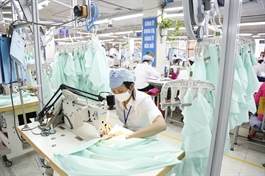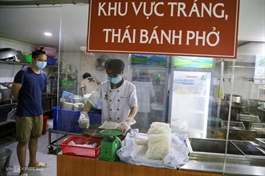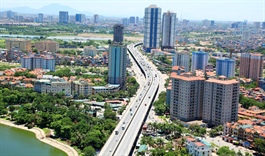GDP to reach 3.5-4 per cent this year
GDP to reach 3.5-4 per cent this year
The country’s GDP this year is expected to reach 3.5-4 per cent if the COVID-19 pandemic is controlled in September and a 'new normal' achieved from the fourth quarter, said Minister of Planning and Investment Nguyen Chi Dung.

Viet Nam’s exports this year would increase by 10 per cent while State budget revenue will exceed the estimate. The growth will be low but quite impressive in the current global context.
“This forecast is lower than the set target of 6.5 per cent this year, but achieving this level needs a huge effort, requiring more drastic actions of both the political system and localities,” Dung said.
If GDP reaches the level, this will be the second year that Viet Nam's GDP has not completed its growth plan. In 2020, GDP grew by 2.92 per cent due to the impact of the COVID-19 pandemic. This would affect the implementation of the overall goal of the five-year plan in the 2021-25 period.
He said that social distancing has seriously affected production, business, labour and employment. Meanwhile, the country has spent large resources on the fight against the pandemic, affecting State budget revenue and expenditure. The pandemic also affects the establishment of businesses and attracting FDI.
In particular, domestic consumption of agricultural products faces difficulties due to low purchasing power. The increasing input prices have affected the psychology of production expansion and re-herding. In addition, the price of animal feed continued to increase due to the difficulty of importing raw materials and high transportation costs, which greatly affected livestock development.
The minister said localities need to take advantage of the recovery momentum of major economies that have a great influence on Viet Nam's economy. The country should rapidly restructure the economy and add elements of innovation and promote the values of Vietnamese culture and people.
He asked localities to give priority to preventing the pandemic so as it doesn't re-emerge, leading to social distancing, disrupting production and supply chains. In addition, they should have regular dialogues with businesses to create a favourable investment environment while closely following new trends to build socio-economic development plans, including public investment.
He added that during the current difficult time, the local authorities’ attitude to businesses is even more important than the above support.
The localities were also asked to ensure social security and support for affected people as well as actively develop local economic recovery plans, take advantage of the world’s new opportunities to achieve growth targets, and contribute to the overall growth of the country.
“Researching and proposing solutions to build an economic recovery programme after COVID-19 is important and urgent. The solutions should be implemented immediately after the pandemic is under control, focusing on recovering key sectors and areas,” he added.
Accordingly, the Ministry of Planning and Investment will submit to the Government an economic recovery project in October. It is expected that the next two years would be the economic recovery time of the whole country.
“The world changes very quickly. If we don't build an economy that is autonomous and adaptive, we will be unexpectedly passive. For example, the pandemic could last for a long time, not to mention natural disasters. Currently, the ministry is developing a project to build an autonomous economy.”
Many international experts said that the economy has many optimistic signals to be able to return to a good growth trajectory if the pandemic is controlled. The Government has been on the right track in defining and implementing a vaccine strategy and key economic policies.
Tim Leelahaphan, an economist in charge of Viet Nam and Thailand at Standard Chartered Bank, said that Viet Nam is on the way to its goal of becoming a regional supply chain centre, a modern industry and a future high-income country. Viet Nam has also benefited from the recent supply chain shift. However, it should be noted that the ability to control COVID-19 would play an important role in Viet Nam's economic prospects in the short term.
Economists also said that the driving force of economic growth depends heavily on the implementation speed of support solutions for people and businesses; expanding commercial activities, taking advantage of opportunities from free trade agreements (FTAs), digital transformation, and accelerating disbursement of public investment capital. This is the short-term and long-term driving force for Viet Nam's economic growth and also the measures that Viet Nam has taken since the outbreak of COVID-19 in early 2020.
Economist Vo Tri Thanh said the Government's solutions to continue implementing security and business support packages are timely. However, the important issue is the implementation speed of support policies, with more accessible criteria to maximise support for businesses, ready to prepare for the post-COVID-19 period.

























